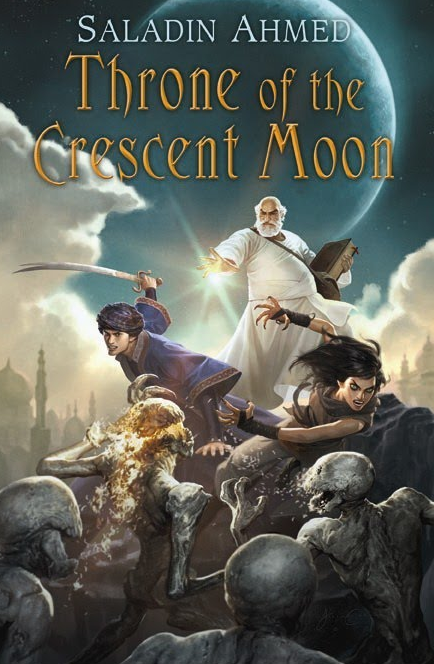A Book Starring A Fat, Middle-Aged Demon-Hunter
 Editor’s note: Joel is reading his way through the finalists for the 2012 Nebula Award for best sci-fi/fantasy novel. Read his introduction here.
Editor’s note: Joel is reading his way through the finalists for the 2012 Nebula Award for best sci-fi/fantasy novel. Read his introduction here.
The mainstream success of Game of Thrones aside, it’s easy to see why many readers might find reading fantasy embarrassing and/or intimidating: not only do the books have silly covers and often silly names (my wife likes to read them off in a silly voice—even George R.R. Martin is not immune, though I suppose A Storm of Swords is kind of over-the-top), every single one of them seems to be 600 pages. But wait, there’s more—it’s also book one in a projected series. So in that regard, Saladin Ahmed’s Throne of the Crescent Moon is award-worthy in my book just for bucking the trend and managing to tell a complete story in under 300 pages. Even better: after finishing it, I’m actually hoping for a sequel.
Partly it’s because Ahmed manages to avoid the other trend in fantasy writing, one far more ubiquitous than series bloat: the quasi-European setting, with kings and princes pitting their knights against one another, an endless parade of nobles fighting for the throne. Not to say those books can’t be good or different. There are just a lot of them. Throne of the Crescent Moon is an entirely different animal, with a setting rich with the flavors of Middle Eastern culture and religion, and nary a noble lord in sight. The characters are also decidedly refreshing and unconventional. When did you last read a fantasy novel starring a fat old man so worn out by years of monster hunting that he’d rather stay at home and enjoy his private library? (Note: this is pretty much the role I would take in the same situation, and I am not yet fat or old. Or a monster hunter, come to think of it.)
Adoulla is said fat old man. He can’t seem to retire from the demon-hunting game even though it is destroying his body and his chances for happiness with the local brothel owner. His apprentice Raseed, a devoutly religious, highly-skilled dervish (think ninja), pursues their calling with more fervor, but seems to spend most of his time being offended by his master’s swearing, womanizing, and laziness. The two are somewhat unwittingly drawn into a plot that comes to involve Zamia, a young shapeshifter girl bent on vengeance for the deaths of her family at the hands claws of monsters, a dashing Robin Hood figure known as the Falcon Prince, and the tyrant ruler of the Crescent Moon Kingdom. Oh, and some more middle-aged friends of Adoulla’s.
It really is interesting to read an adventure story in which the most compelling characters are all pushing retirement age. Adoulla, and his struggle with his choices, his calling, and his faith, is far more interesting than the headstrong Raseed, whose moral superiority is predictably challenged when he finds himself falling for Zamia (eye roll). The novel also impresses with its blending of magic and religion (spells generally involve merely invoking the name of God), another element that sets it apart.
Perhaps the most distinguished characteristic is Ahmed’s prose. Though the story is tried and true adventure stuff, with a plot that takes a while to get going and a journey that offers few surprises along the way, it is genuinely a pleasure to read, filled with delicate descriptions, subtle world-building, unexpected humor, and wonderful character moments. And, you know, bloody mayhem and monsters.
Why was it nominated? Simply put, in a market glutted with “grimdark” Game of Thrones wannabes, Throne of the Crescent Moon is something different, a nod to the sword & sorcery tradition that also feels contemporary, with a rich, lived-in setting inhabited by fully dimensional characters.
Does it have a shot at the Nebula? This is the first of the nominees I’ve reviewed that I genuinely believe is a contender for the prize. Though this is his first novel, Saladin Ahmed has already picked up awards recognition for his short stories, including a Nebula nomination in 2010. He was also a finalist for the John W. Campbell Award for best new writer that same year. Moreover, there’s a lot of love out there for the book itself, as witnessed by its inclusion on the shortlist for the 2013 Hugo Award for best novel.